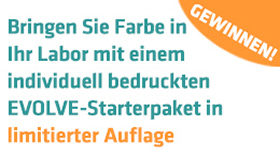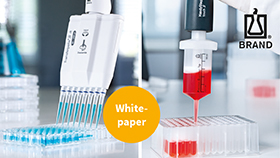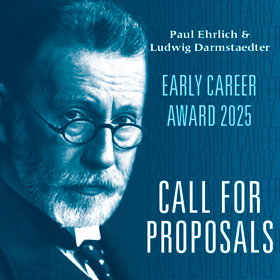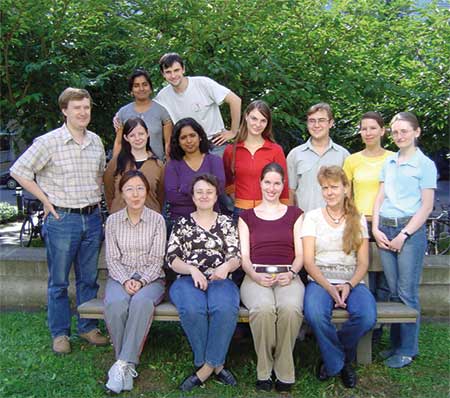From Mutterland to Mutterland via Vaterland
Career strategies for young European scientists
by Vasudharani Devanathan, Labtimes 03/2016
Page 1 | Page 2 | Page 3
Fascinated by Germany, Indian neuroscience graduate, Vasudharani Devanathan, packed up all her bags and started her PhD in Hamburg. After ten years in Europe, expanding not only her scientific skills, she’s now back in India at a shiny new institute, bringing in all the know-how gained during her German adventure. Here’s her story.
This is all about my move from India to Germany and back to India, hence the title. For the love of Deutsch and Deutschland, here and there a few German words will pop up in this article but don’t worry, you will understand.
Just after a regular work day at AstraZeneca in Bangalore, I went to the nearest internet centre and had a surprise waiting for me in my mail box. I was very happy to receive an email from Melitta Schachner from the Zentrum für Molekulare Neurobiologie, Hamburg (ZMNH), in Germany. My joy knew no bounds. The email conveyed the message that I will be called for a telephone interview and if selected, will be invited to start my research work at her lab with a three-month observation period. These three months, as I understood, are the personal interview period... probably the longest personal interview ever!
Curious about Germany
Like the majority of Indians, I was also prepared to go to the USA but 50% of my heart leaned towards Germany. For two reasons, first, my curiosity about Germany. Many of my friends and seniors told me that the US is a more friendly country but deep in my mind I was always convinced that Germany would be perfect for me. Second, I had been working for two years after my post graduation and was concerned that I had lost those two years. That’s why I wanted to be in Germany where I knew it was possible to finish a PhD in 3.5 years – although, in the end, it took me about 4.5 years to complete!!
All went well during my interview and I landed at Hamburg airport on April 18th, 2003. The Italian postdoctoral scientist, with whom I was going to work, very kindly came to pick me up. All Italians are known to be friendly; she immediately started telling me in detail about Germany with its pros and cons for foreigners. The first thing she said was “Ordnung muss sein”. It’s not important how much you work, it is important how much you write in the methods book and organise your work!
What I understood initially and finally, after ten years of doing research in Deutschland (yes, after living there, I prefer to call it Deutschland rather than Germany) is that “the time taken to organise the work is inversely proportional to the time taken to perform experiments and directly proportional to success. A well-planned and well-documented experiment will require less or the optimal time to execute an experiment yielding a successful scientific solution”.
Quiet Hamburg
It was Easter time in Hansestadt Hamburg (as it is addressed locally!!) and for a person from Chennai, Hamburg was totally empty. In Chennai, you bump into someone almost every minute and if you are “lucky”, every 10 seconds! I was a bit nervous about how I would manage in a city, which is so silent and almost dead. The next morning, however, when I went to the city centre and the Alster lake, my fears were dispersed. I saw life everywhere and such an incredibly accentuated spring, for the first time in my life! There were cherry blossoms in abundance.
My apartment was in the beautiful urban district of Eppendorf, just behind the Universitätsklinikum Eppendorf (UKE). My new workplace was situated just across the UKE campus, at the ZMNH. The Tuesday after Easter Monday, I joined the lab.
Our lab had about 30 PhD students and 15 post docs from all over the world. There were people from countries, I hadn’t even heard of before joining this lab. For example, while having tea in the “Küche” on the third day, I met another PhD student, who told me she was from Georgia. “Atlanta, Georgia” I wondered? She jumped out of her chair and indignantly replied, “No Vasu, it is in Eastern Europe and it is older than that Georgia”.
Refining more than one skill
Thus, not only my scientific skills developed but my geographical, cultural, ethnical knowledge developed tremendously, too. I opened up to new cultures and my tolerance for different kinds of people increased enormously. The first getaway with my lab mates was to the Hafengeburtstag (literal translation: harbour birthday). It is special and unique for Hamburg and celebrated with great joy there. Indeed, it was a memorable evening. We walked all along the harbour and on our way back, passed through the Reeperbahn, Hamburg’s world-famous entertainment district.
Our lab life was simple: arrive at the lab at around 09.00 am, start experiments, have a cup of coffee with Franzbrötchen (Butterbrezel during my life in Tübingen). There were about ten of us having lunch together, which was always an exciting happening, with many varieties of food from different cuisines! Post-lunch meant going back to Arbeitszeit and then we had dinner in the lab, too. Normally, I would be back home around 10.00 or 11.00 pm. Amidst such scheduled lab times, we also tried to take small breaks for a jog along the Alster lake or in the Eppendorf park, or go for a quick swim at Holthusen-Bad or Kaifu-Bad.
Seminars and barbecues
We had some really stressful times, when experiments did not work for about two to three months. This usually meant a lot of brain storming, reading and discussion sessions! During my lab week, I also had two seminars. A smaller one, which only group members attended, and a big seminar with the entire lab. With such a huge lab, the big seminar sometimes looked like a mini symposium session at a conference! Barbecuing is a true German tradition and we were no exception. Every summer, there was a barbecue in the Eppendorf park, which I miss, even to this day!
All said and done, I completed my PhD with a Summa cum Laude defence and joined Bernd Nürnberg’s lab for my postdoctoral training. I moved to Düsseldorf (my husband was working there), carrying a lot of memories from Hamburg. In the beginning, it was hard for me to accept the fact that I had to move away from the Alster lake, Hafen, Altona, Eppendorf and Hamburg’s numerous cafeterias, pizzerias and pasta bars.
The lab in Düsseldorf was not as big as my PhD lab but had enough people to learn new things and interact. Düsseldorf is a beautiful city, too – very elegant, classy and the Altstadt walk is the best thing to do on a Saturday evening. Bernd Nürnberg is a gentle and kind person, and one can learn a great deal of things from him. Unfortunately, the lab soon moved to Tübingen and so did I.
Page 1 | Page 2 | Page 3
Last Changed: 21.06.2016









